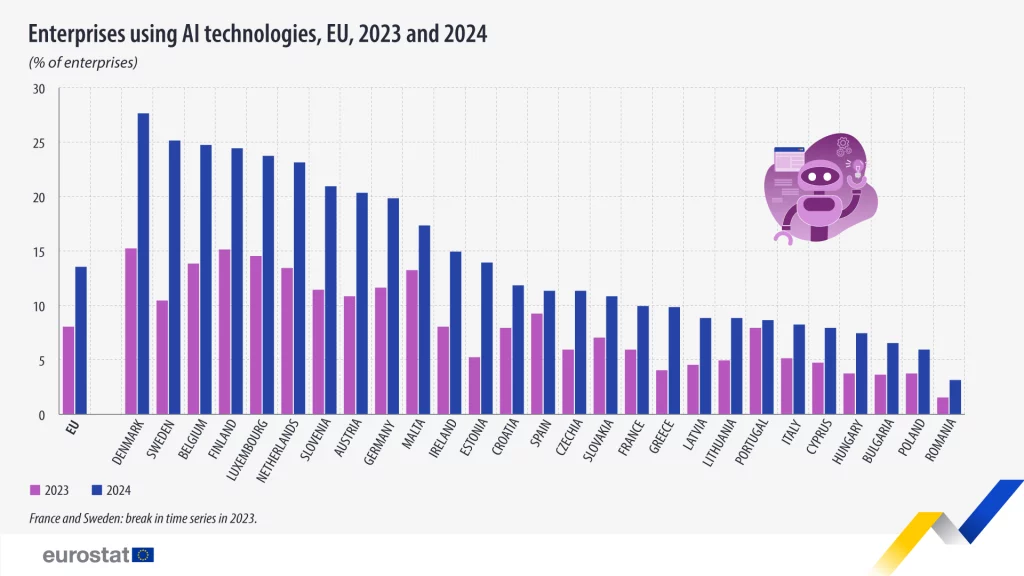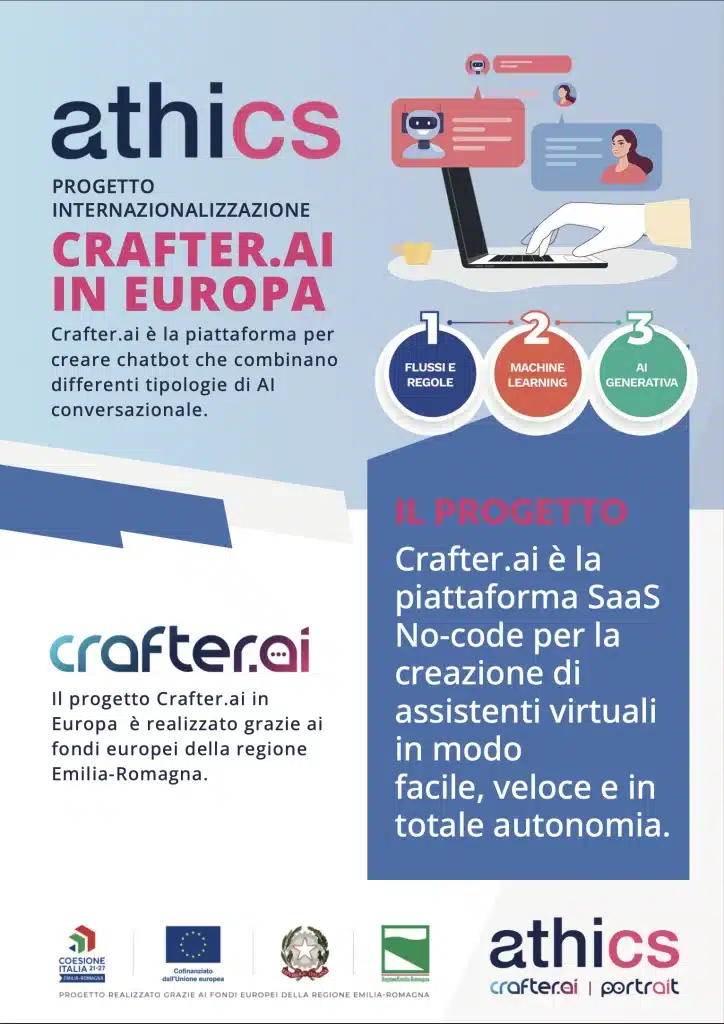The market of artificial intelligence in Europe is growing: the European technological landscape is rapidly transforming thanks to the explosion of AI solutions.
In Italy and the rest of the continent, AI is becoming a key tool for innovation and business competitiveness.
In 2023, Italy recorded an extraordinary growth of 52% compared to the previous year, while the AI market in Europe sees a third of companies embrace this technology, with a growth of 32% from 2022.
During 2024, AI continued to grow, reaching €909 million (+34.8% on the previous year)
According to Eurostat, for 2025 the market is estimated at around €4.8 billion (approx. $4.8 billion), while projections indicate a doubling to €1.8 billion by 2027.

Updated on July 8th 2025
Estimated reading time: 6 minutes
Table of contents
A push towards innovation
According to the Amazon Web Service report “The perspectives of 30,000 European citizens and businesses on our digital future”, if the rate of AI adoption were to remain constant until 2030, it could generate an added value of 600 billion euros, bringing the European GDP from 2.8 to 3.4 trillion euros.
These data are the result of a large survey conducted on 6,000 citizens and 14,000 companies in the European Union, the United Kingdom and Switzerland.
The push towards digital innovation is also evident in the numbers.
The average increase in spending on digital technologies by companies stands at 21%, while in 2023 33% of companies have adopted AI, compared to 25% in 2020.
These data demonstrate the growing recognition of digital technologies as essential elements for the development and competitiveness of the artificial intelligence market in Europe.
According to Deloitte data, presented at AI Week 2024, the Generative AI segment, in particular, is positioned as a technology capable of increasing organizational productivity to support general economic growth and the GDP of European countries.
It is estimated that the demographic decline in Italy is destined to generate a workforce shortage of 5.6 million units and a simultaneous collapse of GDP of -32% by 2070.
Generative AI is seen in the AI market in Europe as an opportunity to leverage to address this challenge.
In fact, the growing use of generative AI is expected to increase the productivity and efficiency of organizations, helping to reduce the job deficit by 3.8 million within the same period.
The snapshot of the AI market in Europe captured by Deloitte sees 75% of European companies consider generative AI an important means for achieving their business strategy.
54% of Italian companies agree with this line, however, only 1 in 10 companies has already integrated generative AI into their business strategy.
Athics aims at the market of artificial intelligence in Europe

Athics international strategy is supported by the “Call for support for internationalization projects of SMEs, Consortia and aggregations of SMEs – 2023“, announced by the Emilia-Romagna Region.
The project aims to encourage the export and scale up of companies, also encouraging digital export and multi-channel.
Athics’ goal is to focus on Europe, with particular attention to countries such as Spain, Portugal, France, Switzerland and the United Kingdom.
According to Straits Research the chatbot and virtual assistant segment on the AI market Europe is estimated to reach 245 billion dollars by 2030, with a growth rate of 38.7%.
This is mainly due to the growing attention of European companies to improving relationships with customers to encourage customer loyalty.
As part of the positioning strategy on the AI market in Europe, Athics has already started promoting its international presence during 2023 by participating in important events such as the Gartner Data & Analytics Summit 2023 in London, the Chatbot Summit London 2023, We Make Future International Fair Bologna 2024.
Quotes
“With targeted investments and a solid internationalization strategy, Athics is preparing to consolidate its presence in the AI market in Europe, with the aim of contributing to the innovation and growth of businesses on the continent. The events we attended generated interest and promising leads, paving the way for new business opportunities for Athics in the European market. We are certain to continue in this direction also thanks to the continuous evolution of our solutions”.
Paolo Massarani – Managing Director Athics
How artificial intelligence in Europe is used?
5 Ways Artificial Intelligence Is Being Used in Europe
- Business Process Automation (RPA & AI)
Many European companies are adopting AI to automate repetitive and administrative tasks, improving efficiency and reducing costs, especially in the banking, insurance, manufacturing and public sectors.
- Customer Experience and Customer Support
Chatbots, virtual assistants, and predictive analytics enable companies to offer faster, more personalized, and multi-channel customer service, with widespread applications in e-commerce, tourism, telecommunications, and financial services.
- Supply Chain and Logistics Optimization
AI is being used to improve inventory management, forecast demand, optimize transportation, and reduce operating costs, with a strong impact on the retail, automotive, and distribution industries.
- Data analysis and strategic decisions
More and more companies in Europe are using AI and machine learning to analyze large volumes of data and gain insights to make faster and more informed decisions, whether in marketing, finance or production.
- Sustainability and green transition
Artificial intelligence is used to optimize energy consumption, support the management of renewable sources and reduce environmental impact, contributing to the sustainability objectives promoted by the European Union.
Conclusions
The market of artificial intelligence in Europe is experiencing a phase of strong expansion, driven by the increasingly widespread adoption of innovative solutions capable of transforming processes, products and business models. From chatbots to generative AI, through the optimization of operations and support for sustainability, AI is establishing itself as a strategic ally for the competitiveness of European companies. However, the potential of artificial intelligence is still largely to be explored: many companies, especially SMEs, have yet to fully integrate these technologies into their operational strategies. In this constantly evolving scenario, companies such as Athics are positioning themselves as key partners to accompany European companies in the digital transformation process, offering customized solutions capable of generating concrete and sustainable value. Looking to the future, the conscious and responsible adoption of AI will be essential not only to improve productivity, but also to address structural challenges such as workforce shortages and the transition to a greener and more digital economy.
Faqs – Artificial Intelligence in Europe
AI adoption in Europe is growing rapidly: according to the latest data, around 42% of European companies are already using AI solutions on a regular basis, with forecasts indicating that this will increase to up to two-thirds of companies by the end of 2025. Adoption is highest in large companies, but SMEs are also accelerating.
The most active sectors are manufacturing, finance, healthcare, retail, logistics and telecommunications. AI is mainly used for process automation, customer experience improvement, data analysis and supply chain optimization.
In Europe, AI is governed by stringent regulations to protect security, privacy and fundamental rights. The main references are the GDPR (protection of personal data) and the recent AI Act, the first law in the world entirely dedicated to artificial intelligence, which defines precise rules for the development and use of reliable and ethical AI systems.
Updated on July 8th 2025

